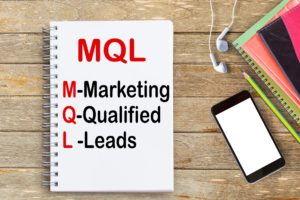
What Are Marketing Qualified Leads And Why Do They Matter?
How are you handling your marketing qualified leads (MQLs)? Once you have a lead at the top of the sales funnel, you can’t just stop marketing and hope that initial lead turns into a sales-qualified lead (SQL). You need to keep your eye on that in-between stage where your MQLs are. You should nurture and engage with them while they are in this stage.

What is a Marketing Qualified Lead?
A Marketing Qualified Lead (MQL) is a type of lead in which the potential customer will engage with your brand which you have provided to them through your marketing efforts.
Don’t Forget the Lead in the Middle
Prospects, also known as contacts and leads, are the consumers at the top of your sales funnel. They have an initial interest in your product or service and might provide an email address or first name, in exchange for a report or other premium offer. However, they are only at the browsing stage and are definitely not ready to make a purchase yet.
At the bottom of your sales funnel are your sales qualified leads, also known as SQLs. These leads are ready to make a purchase. This stage is when your sales people need to be in contact with them, ready to provide additional information and incentives to finalize the sale.
There is plenty of room between the prospect and the SQL. This stage of transition between browsing and making a purchase is where the marketing qualified lead (MQL) sits.
An MQL has moved beyond the browsing stage and is seriously evaluating whether your product or service meets certain criteria. The are looking for detailed information, like customer testimonials and product specifications, to aid them in making the best decision. MQLs are looking at your competition as well, assessing how you measure up. They are getting third-party opinions and reading product reviews to choose the option that best suits their needs. This is when your marketing needs to shift. Nurture your MQLs by following up with them regularly. Tailor content like whitepapers and case studies to them. This tailored content should show your MQLs how and why your product or service is best for them. MQLs need detailed information about your products and services. They also need to know how you differ from the competition. Having a strong brand identity can help set you apart. This information will help the MQL move towards the decision-making point.
How Can You Tell if a Lead is Marketing Qualified?
To tell when a lead is moving from the prospect stage towards the MQL stage, you need to gather pertinent data from the lead and monitor his/her activity on your website. Then, compare this information to past sales opportunities to determine what direction the prospect is moving towards. Ideally, they are moving towards becoming an SQL.
- Demographic data from the lead, such as location, industry, and business size, makes a difference. Also, how much money do they want to spend? Is your product or service within their budget needs? If it is, the lead is more likely to become an MQL.
- What types of actions are they taking on your website? Frequent visits combined with downloading whitepapers, requesting demos, or other interactions with content is a good sign that the lead will become an MQL.
- How similar are they to your past sales opportunities that have already transitioned from leads into MQLs? Similarities can help you predict the likelihood of the lead becoming an MQL. If your typical customers are established companies with a large budget, a start-up with a limited budget may not be a good fit. However, that doesn’t mean the start-up won’t make a purchase, it just means that it is less likely to happen.

The exact definition of what an MQL means to your company is something only you can define. But, no matter how you define MQLs, you cannot forget them in your marketing process. Forgetting them means less SQLs, which means less final sales. And that defeats the purpose of marketing in the first place. The next step is learning how to engage marketing qualified leads until they move to being an SQL.



